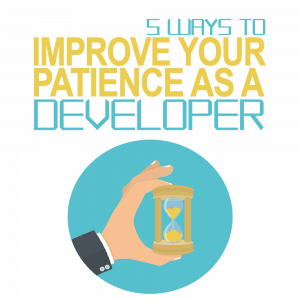 As a developer, there are many skills that no amount of coding talent and education can teach you. Patience is one of them. You will be forced to deal with not only coding issues, but also the opinions of other people, such as your co-workers on a project or users of your application, and that can try anyone’s patience.
As a developer, there are many skills that no amount of coding talent and education can teach you. Patience is one of them. You will be forced to deal with not only coding issues, but also the opinions of other people, such as your co-workers on a project or users of your application, and that can try anyone’s patience.
If patience is something you struggle with, or if you are just looking for ways to further improve your patience as a developer, then these five ways should put you on the right track to being the most cool-headed, patient, and understanding developer on your team.
1. Improve Your Empathy
As a developer, you have intimate knowledge of how your code works, why it does what it does, and how you make your decisions when working on a project. That’s not necessarily true of your co-workers or even users, both inside and outside your company. All of these people come from a wide variety of backgrounds with their own unique perspectives and levels of technical knowledge. As a developer, you need to show empathy toward anyone using your application by trying to see it from their point of view. In the end, they provide you with insight that you would have never thought of on your own.
Just because someone has different knowledge doesn’t mean they can’t add value to your coding. Sure, they may not know how to code, but they may have the knowledge you need to make your coding projects perfect for the end user.
But if you don’t open your mind to what others think and feel about your code, you will come off as very impatient and resistant to what they have to say. Instead, listen with the knowledge that they may have something valuable to contribute to make your project even better.
At the end of the day, that’s what it’s all about. You are all working toward the same goal, so listen to your co-workers and realize that what they have and know may add value to your projects.
2. More Thinking, Less Speaking
I’m sure you expected me to say more listening and less speaking, but hear me out. While I don’t want to underscore the importance of listening to others when working on your coding projects, this one is more about using your brain to work out all the issues before you open your mouth to comment on them.
What I mean is you need to listen to others and truly think about and consider what they are saying. After all, if you take a few moments to listen to what they have to say, and you truly consider it, you may see their point or even recognize something about your development that you couldn’t see before.
Coding in the workplace is often a collaborative effort. Chances are you will be working on only one aspect of a larger project, with many other individuals coding other parts of the application, along with other people tasked with managing the project or coming up with ideas on what to include in the application. Everyone has a role to play and has the potential to bring great value to the project.
While you may enjoy controlling your part, be open to what others think about it and consider carefully their positions before you comment on what they have to say. Really, I’m saying to be less reactionary with your comments; instead, rely on your brain to work through what they have to say in relation to what you are doing, and you will not only come off as patient, you will also feel that way, too.
3. Slow Down and Think Through Your Projects
In the world of a developer, there are often strict deadlines. One part of a project must be coded and completed before you can move onto the next phase. On top of that, you usually have both managers and users checking in to see when your coding will be completed.

Instead, slow down and take the time you need to properly evaluate your project. By properly evaluating your coding, you can work through it line by line with fewer mistakes. Sure, it may take you a little longer to write the code, but you will spend far less time troubleshooting why it’s not working in the first place.
And what does that mean for you? That means you can finish your project much more quickly and without the frustration of an application that simply doesn’t work. When you reduce your overall frustration with a project, you will easily increase the amount of patience you have to deal with anything else that may come up while you work.
4. Relish Your Downtime
I have never seen a lazy programmer. I’m not saying they don’t exist; I’m just saying that in my experience, programmers seem to work too much.
That’s often due to the fact that they love to code. They do it at work and at home. I even think some would code in the shower if they could. While it’s great to love what you do, your mind needs other types of engagement.
A programmer that spends all their time coding and nothing else will often seem short, rude, and impatient. This is due to their brain never letting go. Your brain needs distraction and time to relax. By engaging your other interests, you can give your brain time to recharge so you can properly focus on your project.
As a developer, you want to be good at what you do, but that doesn’t mean you can’t love and do other things. Developing other interests can go a long way toward improving your overall mental health, and a happy developer is a patient developer.
5. Practice a Daily Routine to Reduce Your Impatience
If there is one thing that you require if you want to improve your patience, it’s practice. Incorporating routines into your daily life to help you improve your patience can go a long way toward changing how you react to many situations, not only in coding but also in your whole life.

Everyone already knows you are passionate about the projects you are working on, and often that passion can make you impatient. But it’s possible to be passionate about what you are doing and even strongly defend the what and how of your project while remaining completely composed and patient with others, even if they are being critical of what you are doing.
By focusing on some of the things you can control, such as your breathing and forcing your mind to relax your body, you can more easily cope with potentially stressful situations while remaining calm, cool, patient, and in control.
Developing Patience
It can be difficult to remain patient while you are coding. From the inevitable frustrations you encounter when applications just don’t work, to all the different people and personalities giving you their two cents about what you are doing, there can be a lot of stress while you work. This stress can lead you to seem or even be impatient with everyone around you.
By slowing things down, practicing sound calming techniques, and taking a few minutes to put yourself in their shoes, you should be able to improve your patience and remain calm no matter what happens on the project you are working on.
